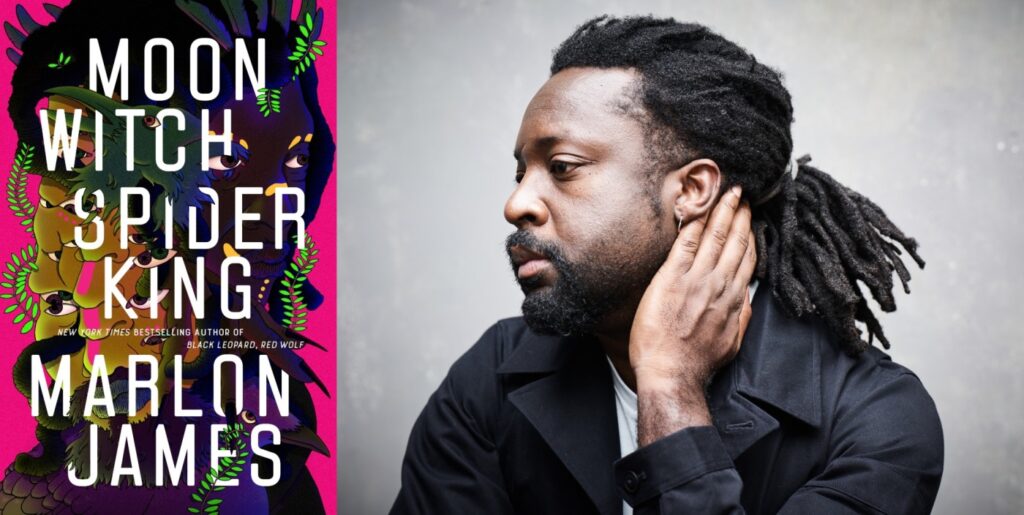
When Marlon James began the research that would go on to inform his Dark Star trilogy, he wasn’t planning to write one book – let alone three.
“For a while, I didn’t know what I was envisioning,” James says from Brooklyn on a recent video call, “because a lot of the research I did was merely to do research.”
“Moon Witch, Spider King,” out Feb. 15 from Riverhead Books, is the second installment in the trilogy that began with James’ 2019 bestseller “Black Leopard, Red Wolf.” Through these books, James is inviting readers into a fantasy filled with intrigue and steeped in African mythology.
The author, who grew up in Jamaica, was familiar with some of the continent’s geography and had studied African history in high school and college. Mythology, though, was a different story. “I’m, clearly, descended from Africa, but I knew almost every other mythology but African mythology,” he says.
Mythologies, James says, can tell us a lot about ourselves. “If I don’t have my own [mythology], then there is a part of me that doesn’t understand who I am,” he says. “That’s why I went after those ancient stories.”
And it took some digging. “Researching these topics can be fraught because a lot of the stuff we have on Africa is skewed, flawed or sometimes just plain old racist,” he says. “Sometimes, it’s going beyond all of that and finding out the truth.”
Most of his research focused on sub-Saharan Africa. He was also interested in looking beyond what might appeal to Western audiences. “It was not just researching ancient Africa, but changing how I looked at how I learned,” he says. “I think that was important, too.”
Along this path, there was a lot of self-discovery. “As a queer writer, I hear a lot about homophobia in Africa, in Nigeria or Ghana or Uganda,” he says. “So, I was very surprised, when I started doing research, seeing all these queer and non-binary characters and how our really older and ancient traditions made space for these characters, these personas.”
He adds, “I didn’t come to the research looking for validation, but I found it.”
The Dark Star books are not a linear trilogy, so you could read “Moon Witch, Spider King” first. In it, you’ll hear from Sogolon, the Moon Witch, about the search for a missing boy that’s told in the first novel. In fact, James says that he’s encouraged people to read the second book first, as it might lead to a different perspective on the events.
“I didn’t realize it was a trilogy until I realized that I was very much interested in telling different versions of the same story,” says James.
“I know that is something that I’ve always been interested in how different people looking at the same thing or talking about the same era come up with two different stories,” says James, whose Man Booker Prize-winning “A Brief History of Seven Killings” features a wide range of narrative voices. “The story of Christopher Columbus would be very different if told by an Arawak or a Mayan. I’ve always been interested in that. These novels gave me the sort of canvas to do that.”
But the books also go beyond the quest. “At some point, I became just as interested, if not more so, in their lives before this mission and even their lives after,” says James. “I think because of that – because of the pre- and post-life of my characters – these stories ended up being really big and I realized that they were big enough and substantial enough to be their own books.”
Stylistically, that meant developing different voices for the characters that extend to how they use language. “They’re from two generations, two different places. They have two different sets of values. Their language is also different.” says James of the difference between writing for Sogolon and writing for Tracker, the primary character of “Black Leopard, Red Wolf.”
“At the core of that is that it is two different voices,” says James. “I certainly didn’t want two different novels with the same voice. For one, that would be pretty unrealistic and certainly not reflecting, if not their cultures, then, certainly, their experience.”
It’s at the core of what James is interested in exploring throughout the series. “I’m also just very interested in how people become their unique selves,” says James. “I think that’s one of the things that both novels spend a long time trying to examine.”
Related links
10 science-fiction and fantasy books and authors Murderbot creator Martha Wells recommends
How growing up poor, Black and gay fueled Brian Broome’s memoir ‘Punch Me Up to the Gods’
How horror films like ‘Halloween’ inspired Stephen Graham Jones’ ‘My Heart Is a Chainsaw’
‘Binti’ novelist Nnedi Okorafor reveals how new book reflects back on the pandemic
Sign up for our free newsletter about books, authors, reading and more
